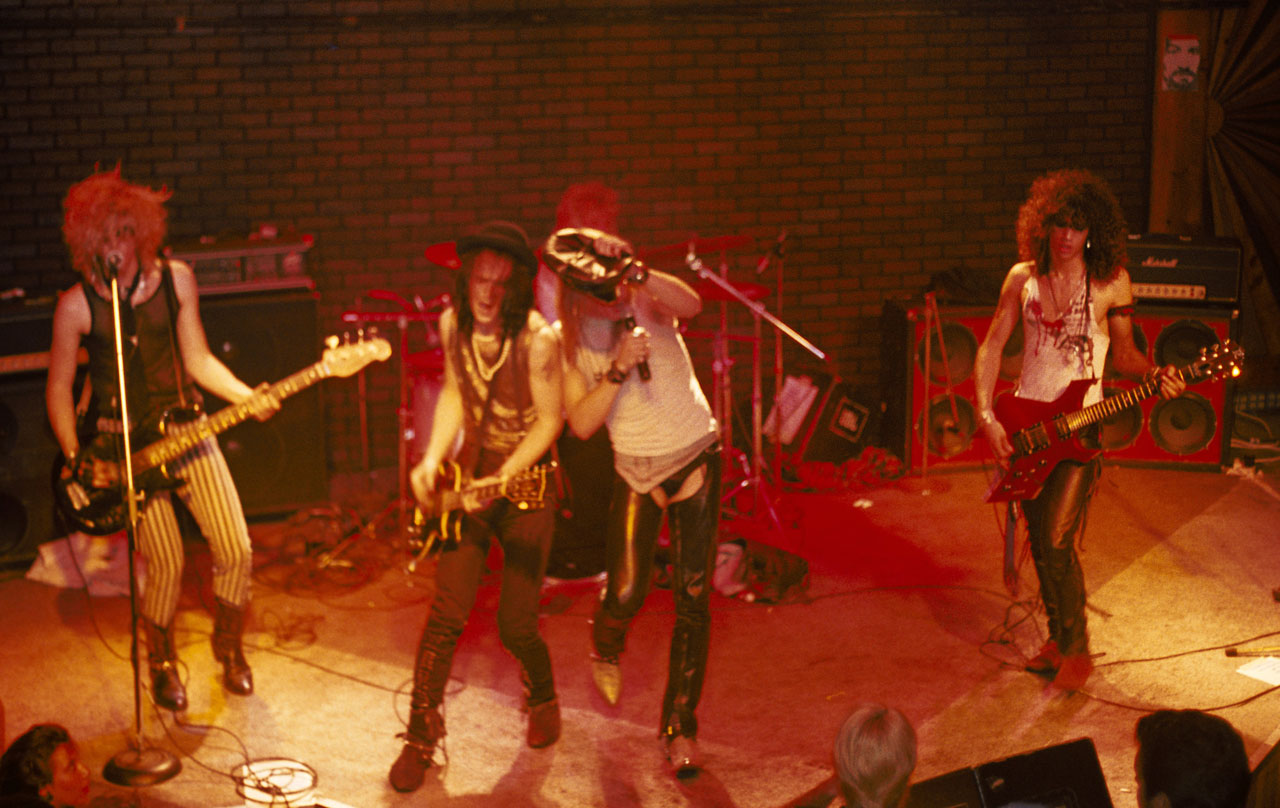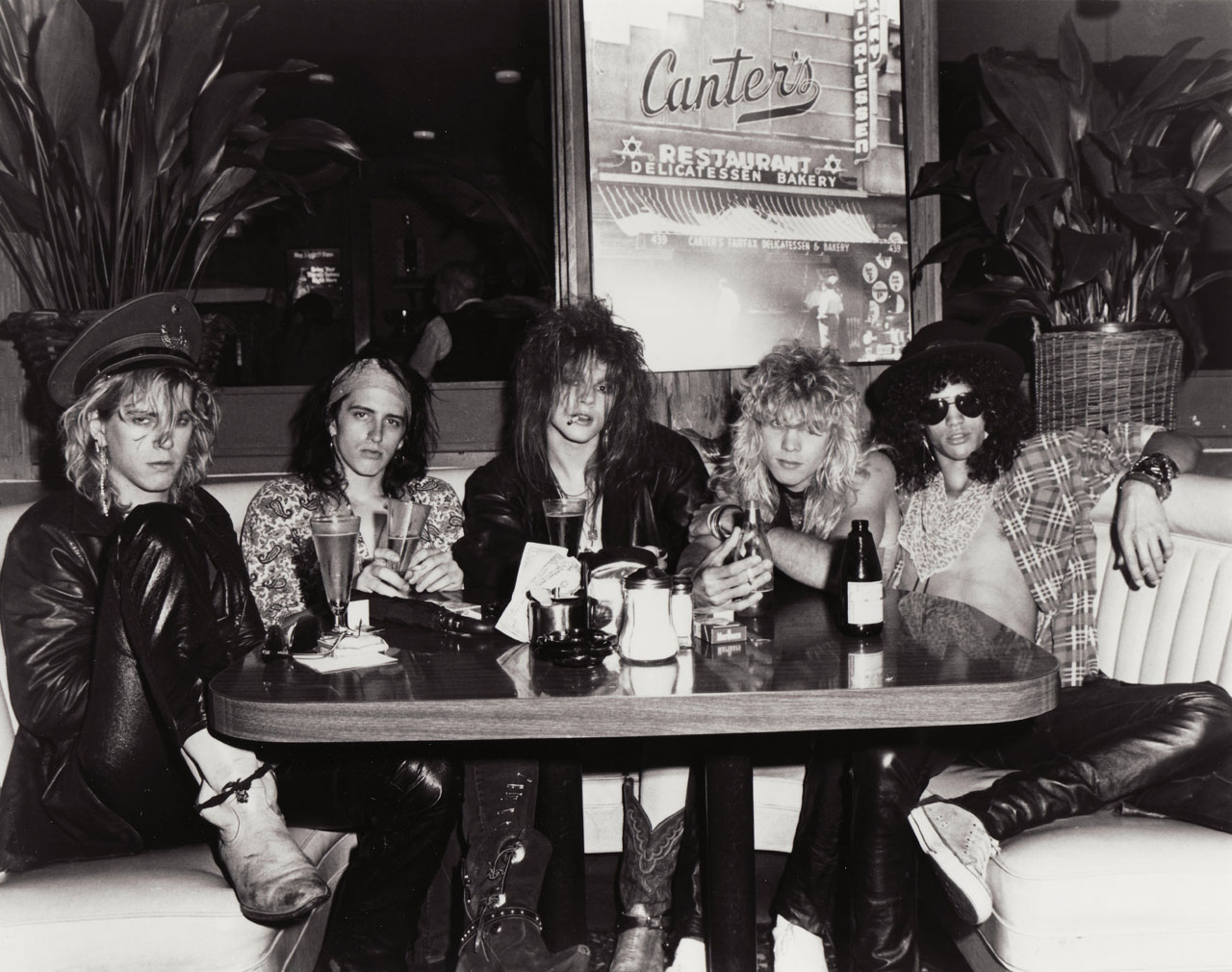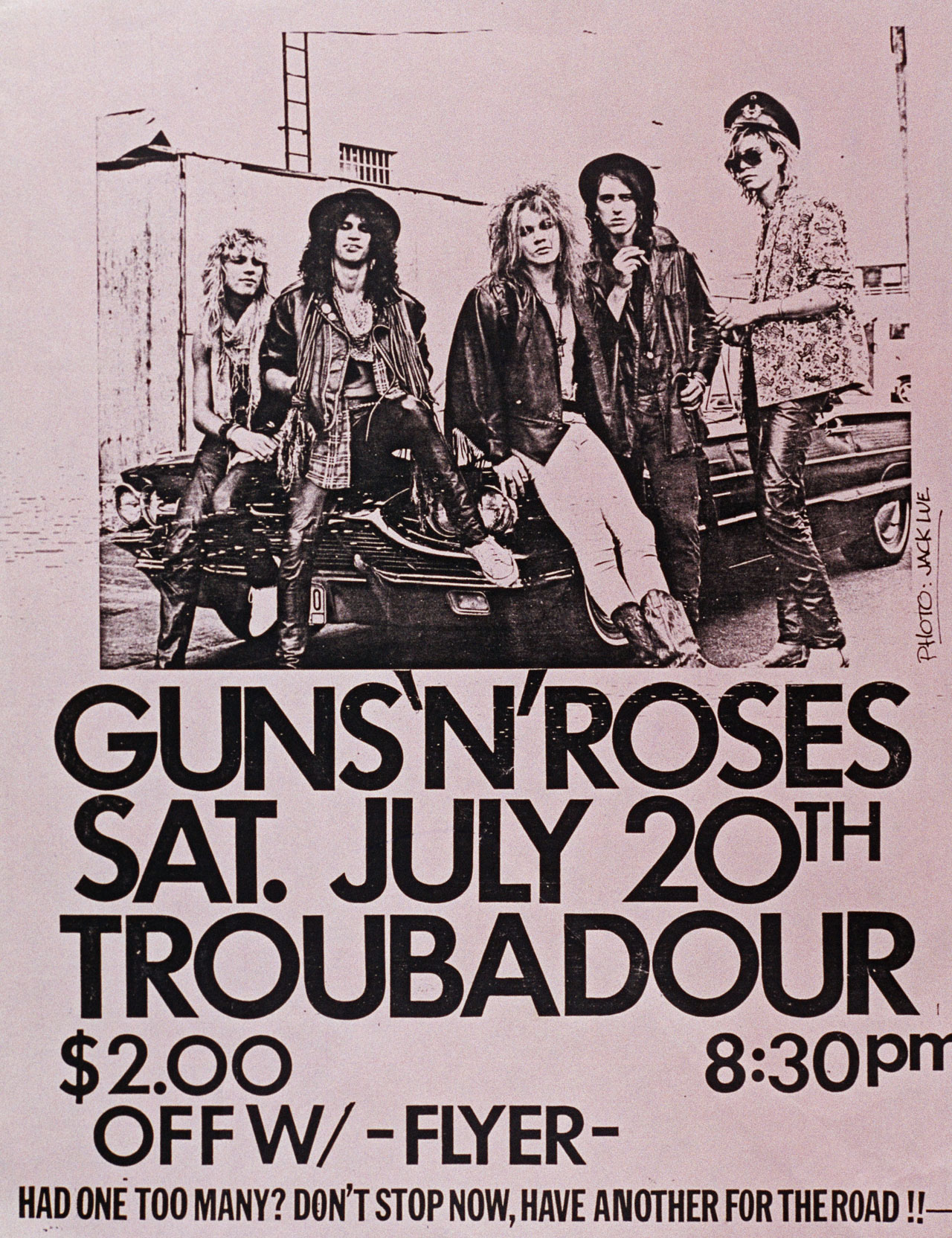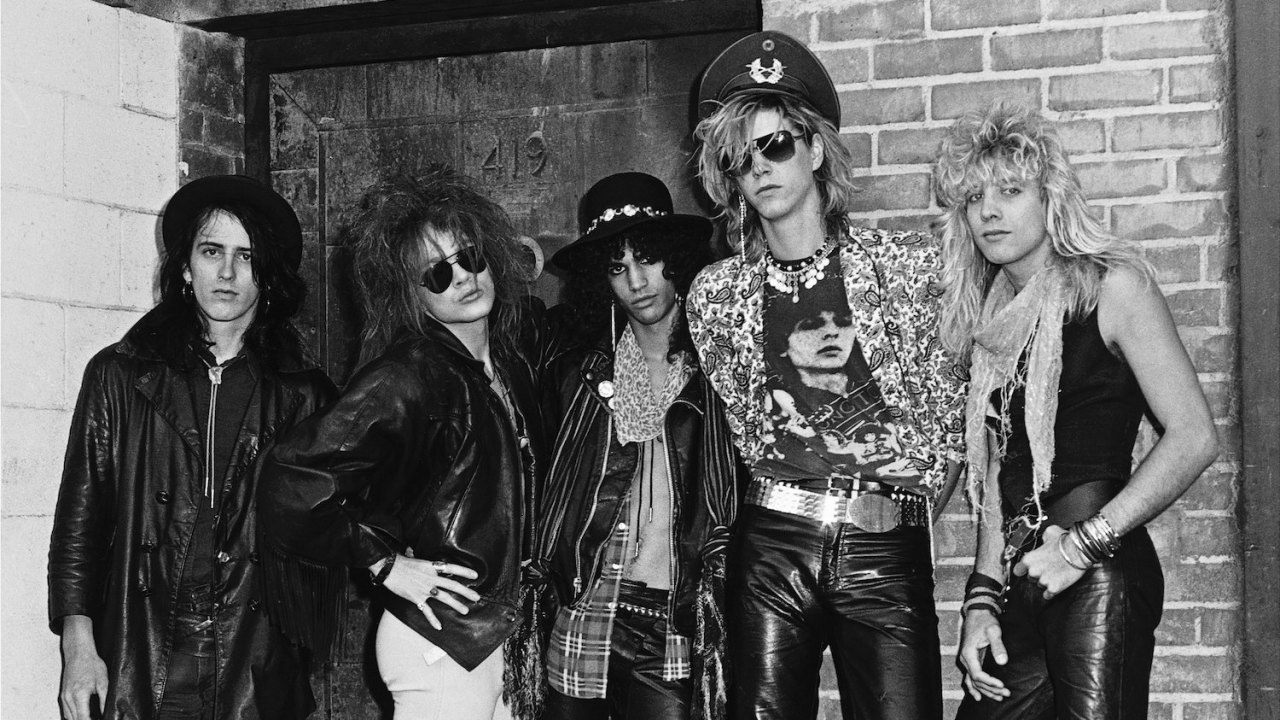The first feature on Guns N’ Roses to be published in the UK press – in an issue of Sounds magazine dated April 4, 1987 - carried an evocative headline: Raising Hell In The City Of Angels.
The band – singer Axl Rose, guitarists Slash and Izzy Stradlin, bassist Duff McKagan and drummer Steven Adler – had recently finished recording their debut album Appetite For Destruction. The album would be released in August, and before that, on June 19, 1987, Guns N’ Roses would make their live debut in the UK at London’s Marquee club.
Sounds writer Paul Elliott met the band in LA the day after they played an album launch party gig at the Whiskey A Go Go club. After a booze-fuelled lunch at the Hyatt hotel on the Sunset Strip, they moved to a room at the cheaper Park Sunset Hotel across the street, where the Sounds interview took place under the watchful eye of the band’s manager Alan Niven. Guns N’ Roses already had a reputation as the wildest band in Los Angeles. They had been nicknamed ‘Lines N’ Noses’.
Unknown to Elliott at the time, Alan Niven had instructed them to not discuss drugs during this interview, and even had a signal for them to them to change subject whenever drugs were mentioned – he rustled his copy of the LA Times. After the interview, the band went back to the home they shared in Hollywood – a dilapidated place that they named The Hellhouse, a place that became part of the myth of the greatest rock ’n’ roll band of its generation.
In LA, you’re nowhere without a car. All day and long into the night, tyre rubber screeches on hot, shiny road surfaces. Buses? Forget it. Kids can be fully licensed drives at 16 and there’s barely a soul walking the streets.
Glinting in 70s-degree winter sunshine, autos spill off the driveway and crowd the front lawn before a smallish, detached, flaking white-wood house just off Santa Monica Boulevard, home for Guns N’ Roses and a string of friends. It’s breakfast time – three in the afternoon – the day after the band were slung out of the Cathouse, their favourite nightspot, over an incident involving a litre of Jim Beam (supplied gratis by the club’s owner), which left some of the pool room’s furniture reduced to firewood.
More parked cars line both sides of the street, and, as Axl, Izzy, Duff, Slash and Steven slump on the porch for photos, cradling guitars and leaning on a New York-registered Harley Davidson, another three vehicles pull up opposite the house. These are Los Angeles Police Department black-and-whites. Guns N’ Roses and their neighbours obviously don’t mix too good. The squad cars empty slowly and one cop of medium build walks to where a couple of sacks of rubbish and a broken chair sit near the pavement. A rough demo of Guns N’ Roses’ debut record for Geffen, Appetite For Destruction, rips out from a ghetto blaster. The officer smiles from behind regulation shades. “Where’s the party?”
“We ran out of beer,” Duff replies.
“Sure. We’ll be back in twenty minutes. Okay?”
All nod as the cop returns to his car.
“Hey,” Axl shouts after him. “How about if we take a couple of pictures on your car? You don’t mind, do you?”
“Er… I guess not.”
They scramble off the porch and squeeze on to the car’s wide hood. As they laugh and pose, you can sense the disgruntled neighbours’ eyes burning, their blood pressure rising. “That’s the third lot of cool cops in a row,” Axl says, grinning. Which is tough shit for the neighbours, wouldn’t you say?
“The West Hollywood sheriffs have got to be the biggest fucking pigfaces I’ve ever known. They know our name, too, because of all the things that have happened.”
This is Izzy, rhythm guitarist, talking a few hours later. Gaunt, a little tired and fidgety, continually smoking and toying with the used butts that overfill an ashtray, he crouches on the floor of my hotel room with his head in his hands and his elbows resting on the large bed where bass player Duff lies asleep. Next to Izzy, singer Axl – a wiry figure, shirtless under a crumpled, kitsch fake-fur coat – does most of the talking. His voice is soft, deep and slightly rasping.

Axl enjoys opening up and the others tend not to compete. He bites his tongue only once during the hour in which we talk – when the group’s manager Alan Niven, sitting quietly behind Slash, advises him that details of legal wrangles with former managers should not be on tape. Slash, a Ramones lookalike, his face shielded by a mass of black ringlets, sticks to one-liners and loses some of his humour to the formality of a question and answer routine. Drummer Steven, likeable, boyish, sun-bleached beach bum, jokes but hasn’t a great deal to say.
Izzy and Axl come from Indiana. Is LA any better?
“Must be,” Izzy says. “I’m still here.”
“We grew up in Indiana and we got a lot of shit,” Axl says. “I got thrown in jail over twenty times, and five of those times I was guilty. Of what? Public consumption. I was drinking at a party underage. The other times I got busted because the cops hated me. So I don’t have much love for that fucking place! People used to say to us, ‘You guys should go to California.’ And when we got here, we found we were five years behind the times. You show up and think you’re going to fit in, and they say, ‘So what boat did you get off?’”
Izzy: “No one in the band was born in LA. We all ended up meeting here. Slash was born in… er, Stoke On Trent.”
Why did you move to LA? Purely to get a gig?
“Yeah.” And do you plan to leave LA pretty soon?
Axl: “Fucking right, man! After this next tour.”

LA serves no real purpose in Guns N’ Roses’ future, although up till now it’s been home, first base, a point from which to build. The sun and the scent of big record company dollars on the West Coast originally drew the five of them together, and the local clubs provided them with vital early exposure. But they’ve not grown at all sentimental about the place. Axl sees the LA rock scene currently in a state of decline.
“It’s died a bit and I think the reason why is us,” he says. “Two years ago we started playing in places like the Troubadour and the Roxy. As soon as we began headlining, we brought in different opening bands like Jetboy, Faster Pussycat and L.A. Guns, and it kind of created this scene. In that crowd we were pretty much the top draw. Eventually, we quit playing for a while to work on the record and the other bands started headlining, but I’ve noticed that some of them haven’t been as cool about helping other bands out. We always tried to help others because I want to see a really cool rock scene. I want to be able to turn on my radio and not be sick about the shit I’m going to hear. Right now, we’re playing again with Jetboy and Faster Pussycat, who have also been signed by major labels, so it’s all starting up again, but only for a couple of gigs. That’s basically all the scene that there is.”
Izzy: ‘Our scene is now dying out because the four main bands (L.A. Guns too) got signed.”
“All in all,” says Slash, “I think the whole idea of an LA scene is pretty trivial.”
Axl: “Well, there’s no fucking New York scene, and as far as I know there’s no real British scene at this kind of club level.”
Slash: “The thought of the LA scene just makes me sick. LA is considered a pretty gay place, and we get a lot of flak from people thinking we’re posers.”
Axl: ‘We know one guy who’s been going to The Rainbow for about four years, telling girls he’s in such and such a band, and he couldn’t play his way out of a wet paper bag!”
Steven: “In LA there’s a million people who think they’re musicians and only a few who are.”
“Poison fucked it up for all of us,’ Axl says. “They said that everyone in LA was following their trend.”

What did you do for money before you signed with Geffen?
“G-I-R-L-S.” Steven laughs.
Izzy: “Sold drugs, sold girls, sold… we just got it. We managed. In the beginning we’d throw parties and ransack a girl’s purse while one of the guys was with her.”
Slash: ‘Not being sexist or anything, but it’s fucking amazing how much abuse girls will take.” “Slash!” Izzy winces.
That’s not being sexist?
“He does it purposely,” Axl says with more than a hint of weariness. He attempts to cleat the air with a change of subject. “We have a song about a girl I met called Michelle, and when I’d written it all nice I thought, That’s not how it really is. So I wrote the real story down, kind of as a joke. The first lines go: ‘Your mommy works in porno/Now that daddy’s not around/She used to love her heroin/But now she’s underground.’ She and her dad ended up loving it. It’s a true story, and that’s what works, I think.”
There’s a fair plastering of dirt and grime and down-at-heel seediness in Guns N’ Roses’ music, too. It was evident on the trashy four-track EP Live Like A Suicide (released in 1986 on their own Uzi Suicide label), and it has spread to the raw mixes of the new album material. And as ‘bitchin’’ as these songs are, they are also remarkably varied in style.
“We’ve got our progressions already planned out,” Axl says. “How we’re going to grow. This record’s going to sound like a showcase. I sing in, like, five or six different voices, so not one song is quite like another, even if they’re all hard rock. In the last year I’ve spent over thirteen hundred dollars on cassettes, everything from Slayer to Wham! – to listen to production, vocals, melodies, this and that. I’m from Indiana, where Lynyrd Skynyrd were considered God to the point that you ended up saying, ‘I hate this fucking band!’ And yet, for our song Sweet Child O’ Mine I went out and got some old Lynyrd Skynyrd tapes to make sure that we’d got that downhome, heartfelt feeling.”
Does it surprise you if people call Guns N’ Roses original?
“Yeah. I think it’s because they haven’t seen it in a long time. This is the only real rock ‘n’ roll band to come out of LA in the last ten years. Van Halen was the last.”
Izzy: “Motley Crue was more teen metal. We go for a more roots-oriented sound than most other bands around here.”
- The A-Z Of Guns N' Roses
- The 10 best Guns N' Roses songs of all time
- The 10 Worst Guns N' Roses Songs
- So, Vicky Hamilton: how do you handle Guns N' Roses?
You’ve been labeled “this year’s model of the perennial LA bad boy band”…
Slash: “The only reason we get that bad boy shit is because the other bands in LA are such wimps.”
And the Aerosmith comparison? You seem to have gleaned a lot from them, even down to the lifestyle.
“That’s OK,” Axl says. “because in my mind, the hardest, ballsiest rock band that ever came out of America was Aerosmith. What I always liked about them was that they weren’t the guys you’d want to meet at the end of an alley if you’d had a disagreement. I wanted to come out of America with that same attitude. So, one reason why there’s been this Aerosmith comparison is, fuck, they were the only goddamn role model to come out of here!”
Somebody told me that you ‘take everything’ – is that true?
All laugh before Steven says: “We were just going to ask you about this bed here…”
“No comment at all,” Izzy grumbles.
Axl: ‘We take everything – and that goes in every single way. We take everything from everything we hear, from what we see and do…”
Sure, Axl.
Survivors, scavengers, sexists, sleazeballs, brats, bums, bad apples… If there is a familiarity about Guns N’ Roses it is hardly surprising – the motions they’re going through are timeless. These five are simply the latest in a long line of no-goods upholding a great and glorious rock’n’roll tradition. And in a year when raising hell has regained its glamour, Guns N’ Roses are calling the shots.
As a Geffen employee says, off the record: “Guns N’ Roses? Yeah, they’ll make it. If they live…”

